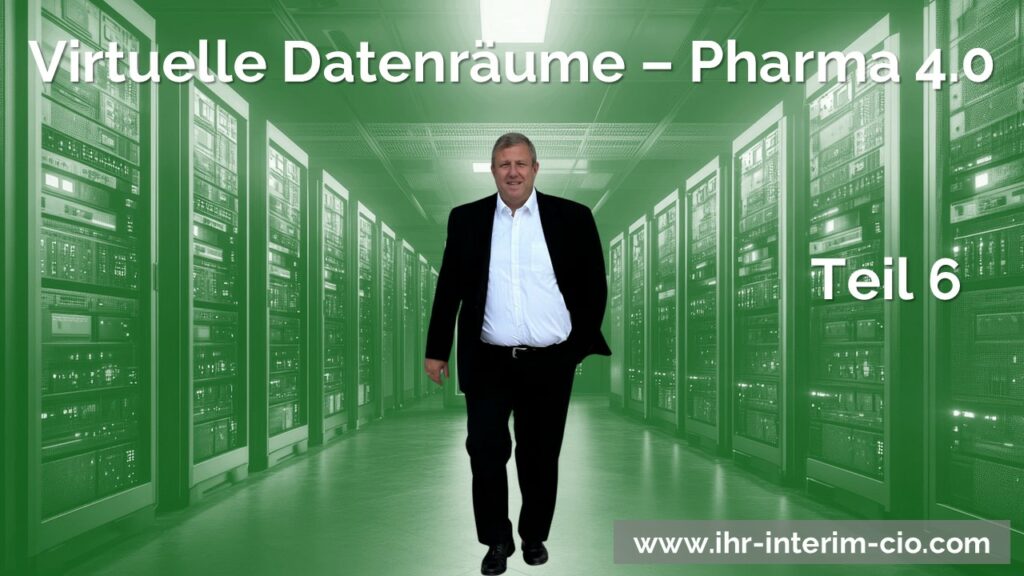
Interim CIO: Dr. Claus Michael Sattler
From serialization to digitalization
How CDMOs are mastering the leap to Pharma 4.0

In the rapidly evolving pharmaceutical industry, Contract Development and Manufacturing Organizations (CDMOs) are facing the challenge of managing the transition from serialization to comprehensive digitalization. This transformation, often referred to as the leap to Pharma 4.0, is changing the way medicines are developed, manufactured and distributed. In this blog post, we take an in-depth look at how CDMOs are mastering this transformation and the opportunities and challenges they face.
The path from serialization to digitalization
The journey from serialization to digitalization began with the need to uniquely identify and track pharmaceuticals. Serialization was the first step towards a digitized supply chain, but it is only a small part of the bigger picture that is Pharma 4.0.
Serialization as a basis
Serialization originally served to combat counterfeiting and improve the traceability of pharmaceuticals. It laid the foundation for digitalization by forcing CDMOs to rethink their processes and integrate digital technologies into their production lines.
The leap to comprehensive digitalization
It is a big step from serialization to digitalization. While serialization focuses on the labeling and tracking of products, digitalization in the context of Pharma 4.0 encompasses the entire value chain. It involves the integration of technologies such as artificial intelligence (AI), machine learning, Internet of Things (IoT) and advanced data analytics into all aspects of drug development and manufacturing [source: 1].
Challenges for CDMOs on the way to Pharma 4.0
The transition to Pharma 4.0 presents CDMOs with unique challenges:
Complexity of the systems
CDMOs have to integrate a variety of systems that are often used by different customers and for different products. This heterogeneity makes digitalization particularly complex [source: 4].
Flexibility vs. standardization
A key balancing act for CDMOs is to implement standardized processes without losing the flexibility required to meet individual customer needs [source: 4].
Regulatory requirements
The strict regulation of the pharmaceutical industry requires all digital solutions to be compliant, innovative and efficient [source: 1].
Strategies for a successful transformation
To successfully master the leap from serialization to digitalization, CDMOs rely on various strategies:
Implementation of cloud-based solutions
Cloud platforms offer CDMOs the opportunity to manage data centrally and respond flexibly to capacity requirements at the same time. They enable improved collaboration with customers, increased data security and scalability of the IT infrastructure [source: 1].
Use of AI and big data
By using artificial intelligence and big data analytics, CDMOs can optimize production processes, improve quality control and develop predictive models for demand [source: 1].
Digital twins
The implementation of digital twins enables virtual representations of production processes that allow simulations and optimizations in real time [source: 3].
Process harmonization and process standardization
To facilitate software-based digitalization, CDMOs are actively working on harmonizing and standardizing cross-departmental processes [source: 4].
Success stories in the industry
Some CDMOs have already made remarkable progress on the road to Pharma 4.0:
Samsung Biologics
Samsung Biologics has completed the digital connectivity phase, enabling the CDMO to offer an advanced AI-based service to its biopharma partners [source: 5].
Vetter Pharma
Vetter Pharma has developed a CDMO guide to overcome the challenges of digitalization in the pharmaceutical industry. The guide focuses on harmonizing processes and building flexible digital systems [source: 4].
Future prospects
The future of CDMOs in the context of Pharma 4.0 promises further exciting developments:
Edge Computing
Processing data closer to the source will shorten response times and increase data security [source: 1].
5G networks
The use of 5G technology will enable faster and more reliable data transmission, which will improve the real-time monitoring and control of production processes [source: 1].
Blockchain technology
Blockchain offers the potential for increased transparency and traceability in the supply chain as well as secure and unalterable data exchange between partners [source: 1].
Conclusion
Lorem ipsum dolor sit amet, consectetur adipiscing elit. Ut elit tellus, luctus nec ullamcorper mattis, pulvinar dapibus leo.
Enter your headline here
The transition from serialization to digitalization in the context of Pharma 4.0 poses major challenges for CDMOs, but also offers enormous opportunities. By implementing advanced digital technologies, CDMOs can increase efficiency, improve quality and better respond to customer needs. Success in this new era will depend on the ability to manage complexity, maintain flexibility and continuously innovate.
The journey from serialization to digitalization is not only a technological change, but also requires a rethinking of the entire organization. CDMOs that successfully master this change will be able to offer their customers significant added value and position themselves as leading players in the pharmaceutical industry of the future.
As an experienced interim CIO, I, Dr. Claus Michael Sattler, specialize in helping companies overcome precisely these challenges. With my expertise in digital transformation, I can help your CDMO successfully make the leap from serialization to comprehensive digitalization in the context of Pharma 4.0. Contact me today at www.ihr-interim-cio.com to find out how we can work together to prepare your company for the digital future of the pharmaceutical industry.
Sources
- https://www.mantellassociates.com/5-trends-shaping-the-cdmo-industry/
- https://www.vetter-pharma.com/de/cdmo-insights/wachsende-bedeutung-von-cdmos-bei-der-arzneimittelentwicklung/
- https://www.koerber-pharma.com/blog/how-cdmos-embark-on-pharma-digital-transformation
- https://www.vetter-pharma.com/de/cdmo-insights/digitalisierung-in-der-pharmazeutischen-industrie/
- https://samsungbiologics.com/media/company-news/pharma-4-0:-cdmos-digitalize-to-enhance-customer-value
- https://www.contractpharma.com/pharma-40-cdmos-digitalize-to-enhance-customer-value/
- https://www.contractpharma.com/pharma-4-0-taking-cdmo-factories-by-storm/
- https://virtual.ispe.org/p/s/pharma-40-at-the-cdmo-psm-digitalised-aseptic-gmp-production-with-paperless-process-for-100-percent-traceability-10628